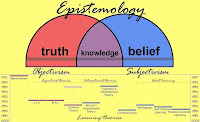In The Age of Disbelief
 |
| Epistemology and Belief Systems |
Ah, epistemology - the thorniest of all the philosophies, and the hardest to reconcile. Epistemology deals with the study and nature of truth. In the tightest of definitions, it's how you know what you know. Think about that for a second. We all have opinions, and they are based on experience, knowledge, personal biases and more. We all have a political position and I dare say it's primarily based on what we can glean from the news, from the internet, and from personal interaction. So we defend our positions based on what we know. Or think we know.
But what is the source of that knowledge we cling to so desperately? Let's keep this discussion within a political context; I won't engage in the debate raging right now between quantum theorists and general relativists regarding the beginning of the known universe. For now, anyway. When one establishes a political position, or belief system, he does so based on information he has at the time. Now that information could be erroneous, or it may be correct. It may be bad information arising from flawed data, or it could be straight up disingenuous propaganda Or it could be true. One has no way of knowing for sure, apart from direct observation. Let's take a few examples of recent issues facing us today, and see if we can find sense by applying epistemology and logic.
Global Warming
This issue has adherents so strongly enamored of this topic that it is literally a religion to them. Wikipedia defines religion as ". . . an organized collection of beliefs, cultural systems, and world views that relate humanity to an order of existence." Hmm. That certainly applies to the GW crowd, who pejoratively refer to those who simply question their dogma as "deniers." Yet report after report has shown that the data upon which their belief system is based is either incomplete, flawed or outright manipulated. In fact, it's been debunked completely. Yet the adherents cling to it blindly. Why?
Net Neutrality
Yesterday the Federal Communications Commission empowered itself to regulate the Internet. Thousands cheered this move, because it supported their contention - dare I say religion- that anything under private corporate management is "bad," and government oversight is "good." In reveling in their delight over a perceived victory over Comcast, ATT, Verizon and others, they miss the point entirely. Those who championed this move - some the very essence of Silicon Valley - really stood up for free speech, didn't they? They did, right? Now that not only government oversight of charges by providers is on the table, but soon to come is licensing and censorship of content. But, hey, we really put the screws to Big Communications, didn't we? No matter that the baby went out the window with the bathwater. Again, why?
How do we know what we know? What is our basis for making decisions that have real and long term consequences? Some would say directed government propaganda drives a demand for more tyranny and less freedom. I would concur. In both cases above, emotions were brilliantly played in order to justify more government takeover. Here's the evil in that: all government systems exist only to retain and seek even more power; of total and complete control of us by them. Remember: Power always seeks more power.
So the debate should not be whether the planet is cooling or warming - it does both over epochs of time - and neither is attributable to human endeavors. The debate is why the government wants to curtail our use of energy, whether demanding we all drive electric cars, or killing off the coal and oil industries, or pouring money into unproven "alternative" energy sources. But we do know why, don't we?
And the FCC isn't empowered to enact any regulation that hasn't been approved in advance by congress, yet it did so anyway. And the FCC won't release the actual rules until after they're enacted. Why? Watch this space: in the next two years of this administration's reign, you will see not an increase in economic freedom, but merely another government monopoly. In the near future, expect some kind of internet use tax, then a campaign to curtail "hate speech" which will be aimed at any content that rises in opposition to an all powerful central government. All this will be in the name of free speech and free and equal access, of course. For the short term, your costs for internet use will increase, your connection speed will decrease, and your content will be censored. In the long term, the internet will be nothing more than a digital version of government sponsored PBS. And we know why, don't we?
| Adoration of the Emperor |
The not-so-hidden-hand in all these power grabs is the Kenyan, who has emphatically stated that he defies congress to vote against his policies of fundamentally transforming America; whether with caps on immigrant work permits, or the Keystone pipeline, or his refusal to deport illegals aliens, or even closing Gitmo. Elections don't matter to the Kenyan. He has the keys to the throne, and he's acting as emperor. Yet he doesn't have the constitutional authority to enact any of these things, it's just there's nobody bold - or brave - enough to stop him.
So what you know, at the end of the day, is that what you "know" is all a hoax. It's just propaganda disseminated by those who are adherents of the religion of totalitarianism. There's a very real and orchestrated campaign to separate you from the concept of free and open government of, by and for the people. Our Constitutional Republic is being replaced with a totalitarian dictatorship, in which rights and freedoms are determined by the government, and to whom these rights and freedoms may selectively be granted. And he has two more years, maybe even more - we'll see - to work his plan.
But as we've seen, logic and epistemology have no place in this government's narrative. Don't think, just do as you're told. Now that's what I call a fundamental transformation of America.

